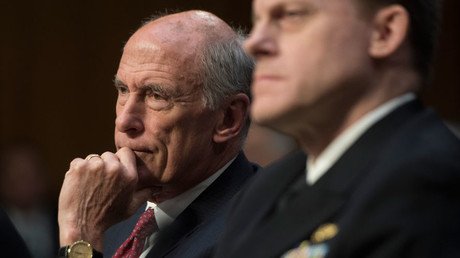Trump asked for loyalty, Comey promised honesty ‒ ex-FBI director’s prepared remarks
The Senate Intelligence Committee has published fired FBI Director James Comey's prepared remarks the day before his testimony on Capitol Hill about his ousting by President Donald Trump.
Thursday morning’s open hearing will be Comey’s first public comments since he was abruptly fired by Trump on May 9. The seven-page text of Comey prepared remarks was released by the Senate Intelligence Committee on Wednesday afternoon.
Comey’s testimony outlined all of his meetings with Trump, the first of which was a January 6 briefing at Trump Tower in New York City on the Steele Dossier. Ahead of the meeting, Comey discussed with the FBI’s leadership team “whether I should be prepared to assure President-Elect Trump that we were not investigating him personally,” Comey wrote, noting the bureau did not have an open counterintelligence case on him.
The then-FBI director “offered that assurance,” even though Trump did not “directly [ask] the question.”
Comey’s practice of documenting his meetings began after the first one-on-one. There were nine total conversations between the two men over the course of four months: three in person and six on the phone.
“I felt compelled to document my first conversation with the President-Elect in a memo. To ensure accuracy, I began to type it on a laptop in an FBI vehicle outside Trump Tower the moment I walked out of the meeting. Creating written records immediately after one-on-one conversations with Mr. Trump was my practice from that point forward. This had not been my practice in the past,” he wrote.
Comey ‘lost confidence of almost everyone in DC’ – Trump https://t.co/exgUYb1dgVpic.twitter.com/J8sTY8tIed
— RT (@RT_com) May 11, 2017
On January 27, Trump and Comey met for a now-infamous dinner. The meeting began with the president asking the then-FBI director if he wanted to stay on in that role. Comey said he found the question “strange” because Trump had previously told him twice that he hoped Comey would stay.
“A few moments later, the President said, ‘I need loyalty, I expect loyalty.’ I didn’t move, speak, or change my facial expression in any way during the awkward silence that followed. We simply looked at each other in silence,” Comey wrote.
Trump “then said, ‘I need loyalty’” I replied, ‘You will always get honesty from me.’ He paused and then said, ‘That’s what I want, honest loyalty.’ I paused, and then said, ‘You will get that from me,’” Comey continued.
Pardon me if im wrong, but is it normal for remarks to be made in a congressional testimony - on a huge issue - leaking on a day before it?
— Alexey Yaroshevsky (@Yaro_RT) June 7, 2017
The two men met again on February 14 for a scheduled counter-terrorism briefing in the Oval Office, during which Trump repeatedly brought up fired national security adviser Lieutenant General Michael Flynn and his reported interactions with Russian officials during the presidential campaign and transition period.
It was during this briefing that Trump asked Comey to “let this go,” which Comey took to be a reference any investigation into false statements Flynn made to Vice President Mike Pence about his conversations with the Russian ambassador in December.
Comey then discussed the conversation with the FBI leadership team, which agreed with him that the investigative team should not know about the president’s request, especially since they did not plan to honor it. Because it was a one-on-one conversation, they decided, there would be no corroborating account.
“We concluded it made little sense to report it to Attorney General [Jeff] Sessions, who we expected would likely recuse himself from involvement in Russia-related investigations. (He did so two weeks later.),” Comey wrote, adding that he decided not to brief the acting deputy attorney general, either, because that role would be filled shortly.
“After discussing the matter, we decided to keep it very closely held, resolving to figure out what to do with it down the road as our investigation progressed,” Comey wrote.
Shortly after, Comey spoke with Sessions about Trump’s concerns about leaks of classified information – “a concern I shared and still share,” he noted. Comey “took the opportunity to implore the Attorney General to prevent any future direct communication between the President and me,” he wrote, noting that he told Sessions he felt it “was inappropriate” that Trump had asked the attorney general ‒ Comey’s boss ‒ to leave the Oval Office so the president could discuss Flynn with Comey, and that “should never happen.” Sessions “did not reply.”
Trump and Comey spoke over the phone on March 30, during which time Trump called the Russia investigation “a cloud” that was hurting his ability to lead the country, and asked the then-FBI director what he could do to “lift the cloud,” Comey wrote. Trump said “he hadn’t done anything wrong and hoped I would find a way to get it out that we weren’t investigating him.”
Comey’s told @POTUS he WAS NOT under investigation three times per his prepared testimony. Democrats and media have lied to voters #Covfefepic.twitter.com/rMSBrvHQ09
— 🎙Wayne Dupree (@WayneDupreeShow) June 7, 2017
Comey then reported the conversation to Acting Deputy Attorney General Dana Boente, who took the lead at the Justice Department on the Russia probe after Sessions recused himself, and asked him for guidance.
“I did not hear back from him before the President called me again two weeks later,” Comey wrote.
Trump “said he would do that and added, ‘Because I have been very loyal to you, very loyal; we had that thing you know.’ I did not reply or ask him what he meant by ‘that thing,’” Comey wrote. “That was the last time I spoke with President Trump.”













